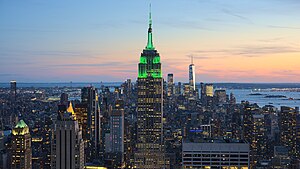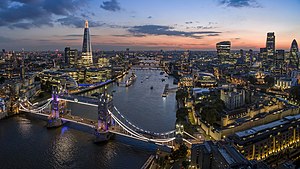
Back Banda global ACE Weltstadt ALS المدن العالمية Arabic Ciudá global AST Глобален град Bulgarian बैस्विक शहर Bihari বৈশ্বিক শহর Bengali/Bangla Ciutat mundial Catalan Globální město Czech Verdensby Danish
A global city[a] is a city that serves as a primary node in the global economic network. The concept originates from geography and urban studies, based on the thesis that globalization has created a hierarchy of strategic geographic locations with varying degrees of influence over finance, trade, and culture worldwide.[1][2][3] The global city represents the most complex and significant hub within the international system, characterized by links binding it to other cities that have direct, tangible effects on global socioeconomic affairs.[4]
The criteria of a global city vary depending on the source.[5] Common features include a high degree of urban development, a large population, the presence of major multinational companies, a significant and globalized financial sector, a well-developed and internationally linked transportation infrastructure, local or national economic dominance, high quality educational and research institutions, and a globally influential output of ideas, innovations, or cultural products. Quintessential examples, based on most indices and research, include New York City, London, Paris, and Tokyo.
Cite error: There are <ref group=lower-alpha> tags or {{efn}} templates on this page, but the references will not show without a {{reflist|group=lower-alpha}} template or {{notelist}} template (see the help page).
- ^ Lenormand, Maxime; Gonçalves, Bruno; Tugores, Antònia; Ramasco, José J. (2015). "Human diffusion and city influence". Journal of the Royal Society Interface. 12 (109): 20150473. doi:10.1098/rsif.2015.0473. PMC 4535413. PMID 26179991.
- ^ Lin, Jan (2012). "World Cities". The Wiley-Blackwell Encyclopedia of Globalization. doi:10.1002/9780470670590.wbeog820. ISBN 9780470670590.
- ^ Pain, Kathy (2017). "World Cities". International Encyclopedia of Geography: 1–9. doi:10.1002/9781118786352.wbieg0525. ISBN 9781118786352.
- ^ Sassen, Saskia (July 2001). "The global city: strategic site/new frontier". Seminar Magazine. No. 503. Archived from the original on 18 October 2006.
- ^ "global city". Britannica. Archived from the original on 20 October 2022. Retrieved 20 October 2022.

